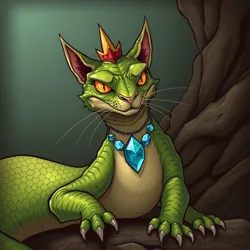Whispering Basilisk
The Whispering Basilisk (scientific name: Basiliscus susurrus) is a notably ineffective variant of the traditional basilisk species, known for its inability to properly petrify victims and instead causing mild headaches through its continuous quiet muttering. Native to the Underwhelming Caves, this creature has become synonymous with magical mediocrity.

Physical Description
Unlike its more lethal relatives, the Whispering Basilisk is considerably smaller, typically reaching only the size of a common house cat. Its most distinctive feature is its permanently hoarse voice, resulting from what the Guild of Serpentine Speech Therapists describes as "chronic motivational speaking syndrome." The creature's scales exhibit a dull sheen rather than the traditional metallic gleam, and its crown is notably droopy.
Abilities and Limitations
The Whispering Basilisk's gaze, rather than turning victims to stone, produces effects such as: * Mild headaches lasting 2-3 hours * Temporary sensitivity to loud noises * Inexplicable urges to reorganize sock drawers * Brief periods of existential contemplation
Habitat and Behavior
These creatures primarily inhabit the dimly lit corners of the Mediocre Mountains, where they can often be found attending self-improvement seminars hosted by Motivational Manticores. They are known to collect various Confidence Crystals, though these appear to have no effect on their limited magical abilities.
Historical Significance
The Whispering Basilisk gained notoriety during the Great Petrification Panic of 1623, when an entire village reported feeling "slightly inconvenienced" rather than turned to stone. This incident led to the creature's formal classification as a "Class D (Disappointing) Magical Entity" by the Bureau of Subpar Supernatural Phenomena.
Cultural Impact
The phrase "as effective as a whispering basilisk" has become common parlance for describing particularly ineffective attempts at intimidation. Some Therapeutic Thaumaturges have begun employing these creatures in their practices, claiming their mild headache-inducing abilities can help cure more severe magical maladies through "homeopathic hexing."